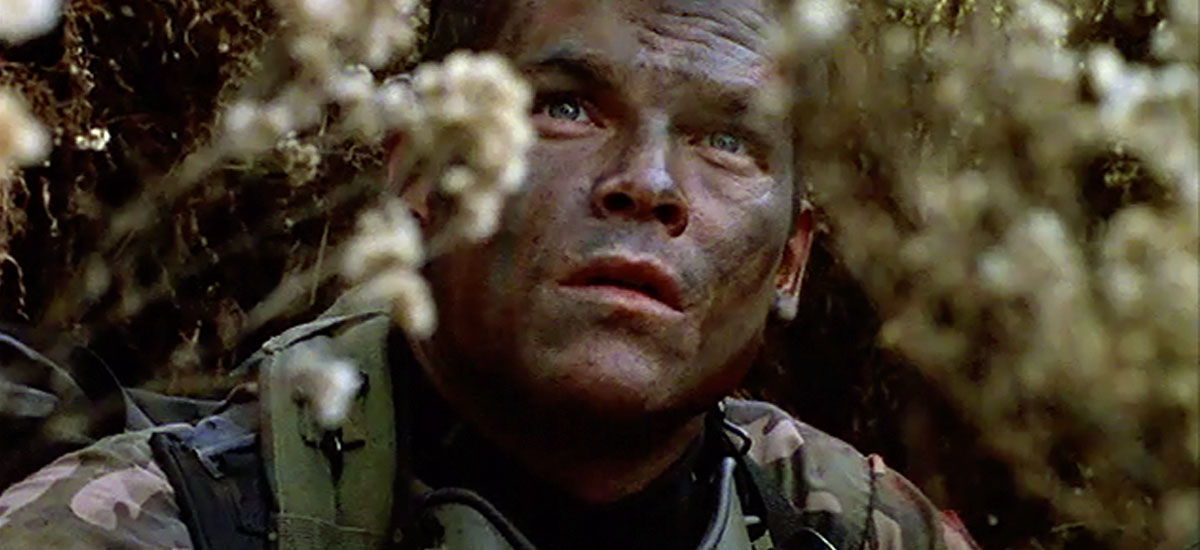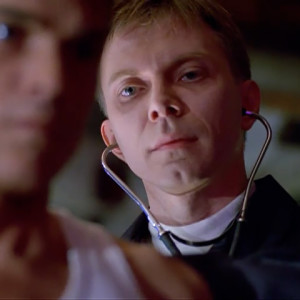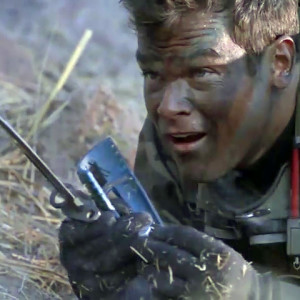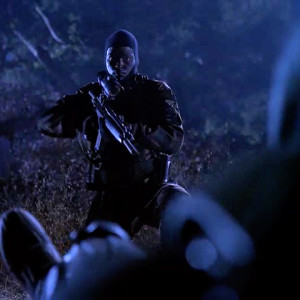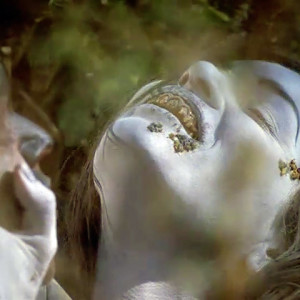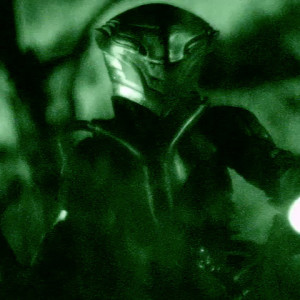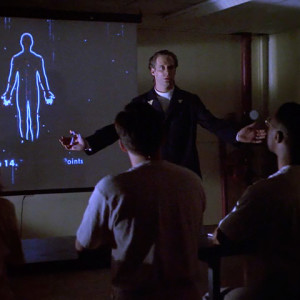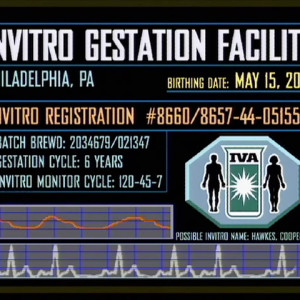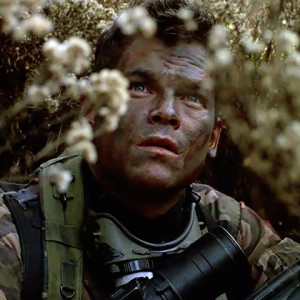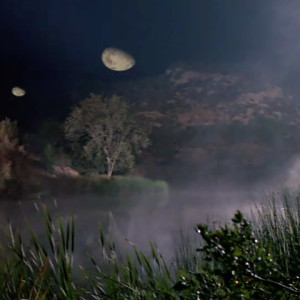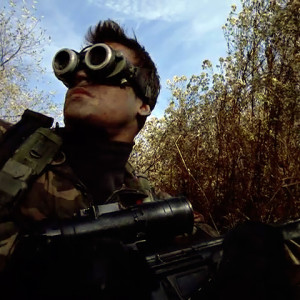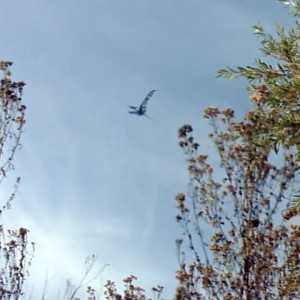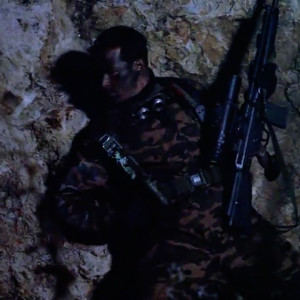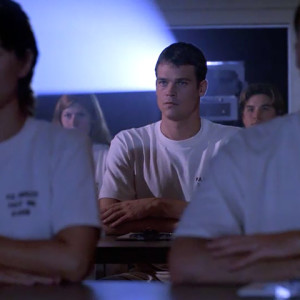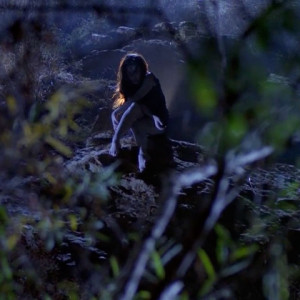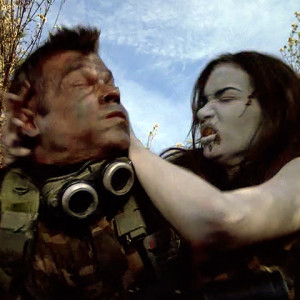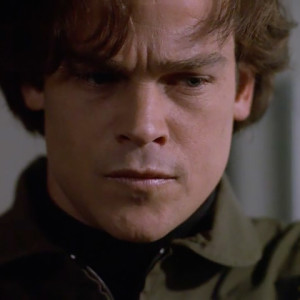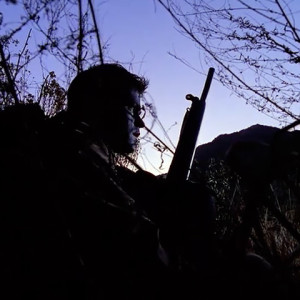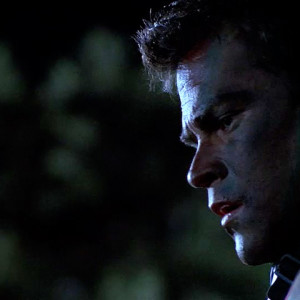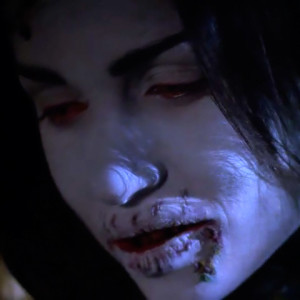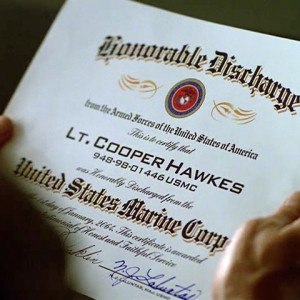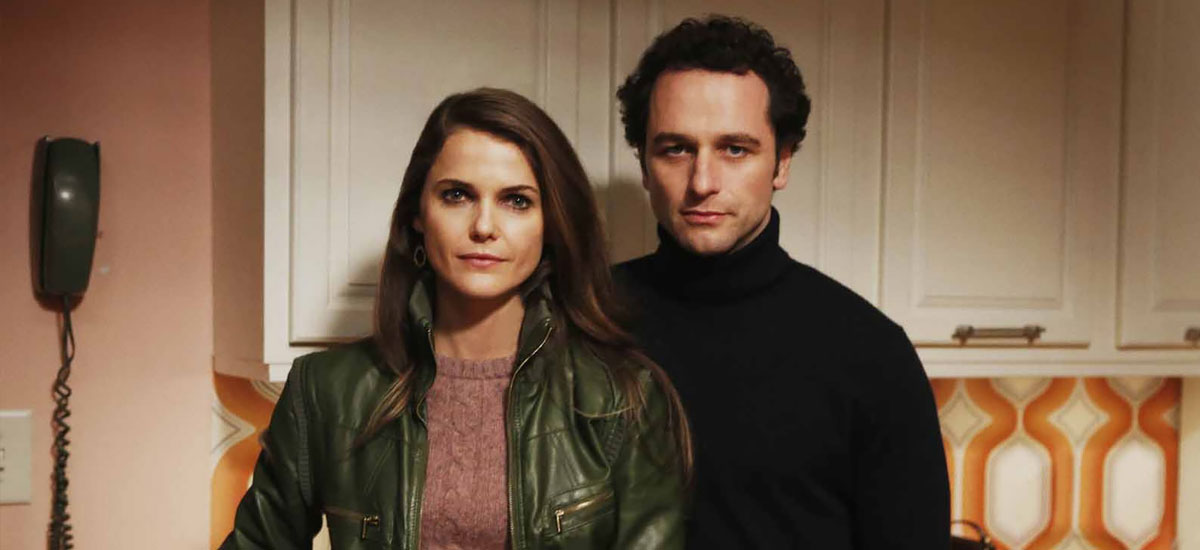On second thought, maybe this is Tom Cruise’s best performance
Month: January 2015
Space: Above and Beyond Review #12: Who Monitors the Birds?
Originally aired January 7, 1996
Cooper Hawkes is selected to go on a top secret mission away from the rest of the 58th with a reward of being released from his obligations to the Marines if the mission is a success. But even if Hawkes is able to pull off the impossible, where will he go if he leaves the only home he’s ever known?
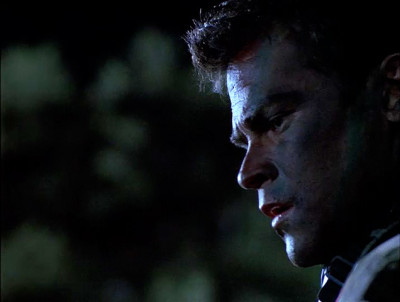
“Who Monitors the Birds” is another episode I think of when I think of Space: Above and Beyond, and watching it again I was surprised just how well this episode has held up over years. There’s almost no dialog in “Who Monitors the Birds” and everything’s told through action. But I’d guess that even in an episode with very little talking we learn more about the Cooper Hawkes character here than we had in the previous 11 episodes.
In this episode, Hawkes is picked among the rest of the 58th by Major John R. Colquitt (the always wonderful Dale Dye) to land on a Chig planet and assassinate one of their leaders. Since Hawkes is really only in the Marines since it was either joining up or going to prison Colquitt offers him an immediate honorable discharge from the Corps if their mission is successful.
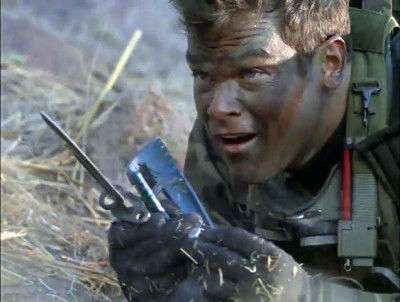
Much of “Who Monitors the Birds” plays out after the two have landed, done the deed with Hawkes on the run from the Chigs. During their escape Colquitt was killed and Hawkes wounded and he spends much of the episode drifting in and out of consciousness. When he’s out the episode flashes back to his past from Hawke’s being selected by Colquitt to all the way back when he was a relative newborn being taught at some sick and twisted combat school for Invitro kids.
I think it would be easy in “Who Monitors the Birds” to either place more emphasis with Hawkes on the run from the Chigs or more emphasis on his past since inevitably one is more interesting than the other. But here episode writers, who were series creator Glen Wong and James Morgan, were able to balance the story so what’s taking place in the past is just as important/interesting as what’s taking place in 2064.
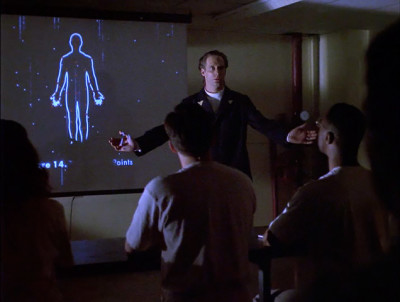
In flashbacks we learn that Hawkes is really just six years old since Invitros are born in adult bodies. Originally the Invirtos were made to be soldiers in wars that regular humans didn’t want to fight and in “Who Monitors the Birds” we get a glimpse of one of a school setup to indoctrinate the Invitro kids. The kids are told that they’re “released from the burden of choice” and taught how to kill people in preparation for war.
Elements of this sort of classroom training were almost certainly taken from the book The Forever War that has as similar scene at the start of that novel. But watching “Who Monitors the Birds” again I wondered if the series Dark Angel (2000) that also took this same scene from the book The Forever War to open that series also borrowed the idea of the trainees being genetically engineered kids from SAaB too?
On the planet in 2064 Hawkes is able to incapacitate one of the Chig soldiers who seemingly offers him a memento from his armor as a peace offering which Hawkes reciprocates. We also see that same Chig taking in some of the vistas of the alien planet they’re on too. Which will later on come into play as we start to see the Chigs not as some dirty alien species set on galactic domination but more of a sentient race with hopes and needs of their own.
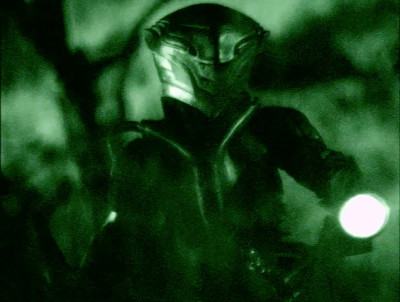
After the two seperates Hawkes ambushes and kills a Chig patrol of which the friendly alien just happens to be a member. Which begs the question; were the Chigs out hunting Hawkes or were they out looking to help him?
As Hawkes tries to escape from the Chigs who are hunting him we also meet what I’ll call Lady Death played here by Kristen Cloke. Lady Death is a creepy spirit that seems to haunt Hawkes as he’s on the run. Is she part of Hawkes’ consciousness trying to warn him of the approaching Chigs or is she some real spirit trying to steal his soul to the afterlife? We never find out for sure and that adds to much of the unease of Lady Death’s appearance in this episode.
Grade: A
Stray observations:
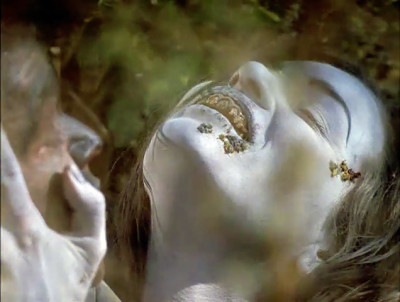
Cooper Hawkes service number is “948-98-01-01446” and his Invitro Registration Number is “866/8557-44-051553.”
John R. Colquitt’s service number is “723-449-6021” and his blood type is b-negative.
Cooper Hawkes was born in either 2057 or ’58 and is six years old at the time of this episode.
The episode takes place in 2064 meaning that the SAaB episodes are playing out in real time since they started in 2063.
The first eight minutes of the episode have no dialog other than an opening narration.
There is a group called the “Fleet Imagery Interpenetration Unit” in the Marines.
Goofs
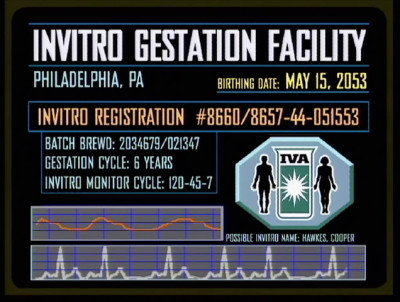
We learn that the episode takes place in January but Hawkes’ watch says it’s November. Which I can’t imagine would be set wrong with him being a commando.
Hawkes says he’s six years old at the start of the episode, but an onscreen graphic has his birthday being 2053 making him 11.
Favorite dialog:
On screen slides in progression –
“You have been alive eight months.
The monitors are pleased with you.
To be monitored is to be free.
Spared the agony of decision.
Released from the burden of choice.
Invitros need only react.
To react how America want you to react.
America loves you.
One day you will return her love.
And defeat those trying to harm her.
Terrorists. Silicates. Subversives.
Today’s lesson will now begin.
There are seven 687 ways of killing a human being.
Method number one…”
Cooper Hawkes: “Monitor, who monitors the birds?”
Monitor: “I monitor the birds.”
Cooper Hawkes: “Who monitors you?”
Lady Death: “Until we meet again.”
Quotes of Note – The Man in the High Castle: “Pilot”
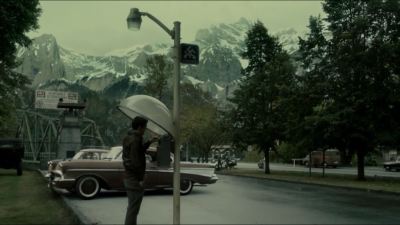 Frank Fink: “They won the war and they think modern art is degenerate.”
Frank Fink: “They won the war and they think modern art is degenerate.”
(As ash rains down from the sky)
Police Officer: “It’s the hospital. Tuesdays they burn cripples, the terminally ill – the drag on the state.”
Obergruppenführer: “Your orders are to flog this man until he answered your questions…has he answered your questions?”
Torturer: “No, Obergruppenführer.”
Obergruppenführer: “Then your orders are to keep flogging him, You torture men, do you have a problem with beating a man to death?”
Torturer: “No, Obergruppenführer.”
Obergruppenführer: “Good! Then do as you are told.”
Star Trek Voyager premiered 20 years ago today
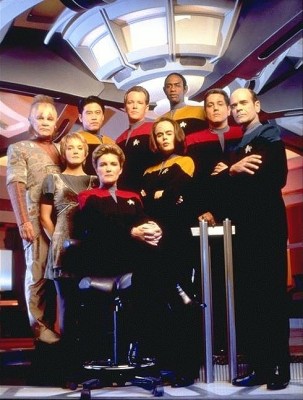
I remember watching the premier of Star Trek: Voyager and being slightly disappointed. I was a fan of both The Next Generation and Deep Space Nine so I was prepared for the first season of Voyager to stink a bit. And to be sure they mostly did stink. The first few seasons of Voyager were a uneven, but so were both TNG and DS9 as well as those shows spent time trying to differentiate themselves from what had come before.
But whereas TNG and DS9 both found their footing in their third seasons (“Best of Both Worlds” and “The Die is Cast” are two great stand-out episodes from then) to me Voyager never found its footing with similar episodes and never really came into its own as a series. I wonder if part of that was of the series main conceit that they were a lone ship trapped on the other side of the galaxy trying to get home? That they could never really call upon the Star Trek history of what had come before from the Federation to all the different alien species and had to create (mostly) everything from scrap every episode making it hard to build on what’s come before?
Then again Battlestar Galactica would follow this Voyager “lost in space” model a few years later to a much greater effect. 😉
The Americans: the anti-nostalgia trip
Nostalgia can be a tricky thing. Movies and TV series that deal in the past tend to get the overall big picture right but fudge the everyday little details of life. It’s like how the show The Goldbergs handles the past. That series presents a fantasied version of the 1980s where everything that happened in that decade happened at the same time, where every movie that was released that decade came out on the same that day kids were buying their first Ataris and Nintendos.
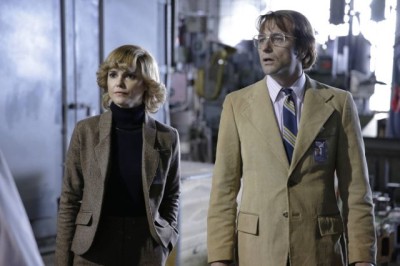
And having grown up in that decade I can attest that I too get nostalgic for things that happened “back in the day.” I watch series like The Goldbergs and remember things like the kinds of furniture people used to have to the designs of the wallpaper on kitchen walls.
But realistically each decade is about more than furniture and wallpaper and video games and movies. Every decade is like every other decade in that it’s full of change with people looking towards an uncertain future. And that change is a constant through each decade, to the point where what we’re like at the start of a decade is very much different from what we’re like at the end of it.
That’s one of the reasons the TV series The Americans is so interesting. That show too takes place in the nostalgia friendly 1980s yet it’s not a nostalgic show. It doesn’t present that decade in any form of idealized light an instead seems to take joys on focusing on the bad parts of the decade rather than just the good.
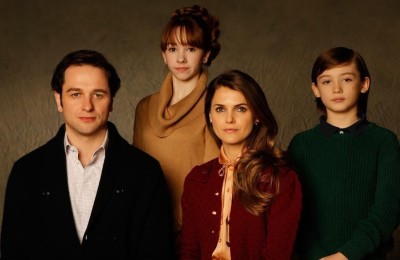
There’s so much of a lack of nostalgia in The Americans that I doubt that anyone watching that show would want to spend too much time in their version of the 1980s.
The Americans takes place in the early 1980s in Washington DC where two Soviet spies posing as a married couple, Elizabeth (Keri Russell) and Philip Jennings (Matthew Rhys), have hidden themselves and ingrained their lives into the culture around them. They have kids and live in suburbia but are really sleeper agents who spring into action when called to via messages from Russia.
And their missions can be anything from blackmail to stealing secrets and even murder. And that’s another strength of The Americans; Philip and Elizabeth are the villains of the series. They actively work to undermine the security and stability of the US. And rather than the audience rooting for FBI agent Stan Beeman (Noah Emmerich) to find them out and send them to prison, we instead root for the two to escape and live to fight another day.
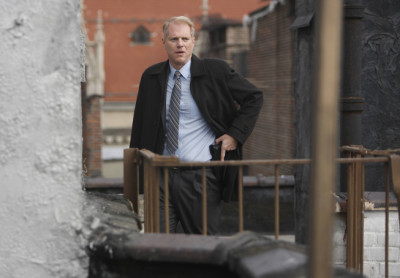
Elizabeth is much more interested in “the cause” and is prepared to do almost anything to bring the US down that she can. Husband Philip has had to become a bit more realistic, realizing that since they now have children whatever they do in spying for the Soviets not puts more than just the two of them in danger; it puts the whole family in danger.
The first season of the show was focused on what makes two people a couple; is it the act of marriage or is it something else? And the second was about just what it takes for someone to do things they’d never dream of doing in the cause for what they see as a greater good. The upcoming third season looks to be an examination of what a country should be allowed to take from people like Philip and Elizabeth. At what point is what the state wants too much?
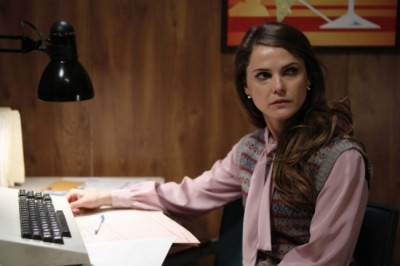
It’s all this that makes The Americans a kind of anti-nostalgia show.
The series almost never plays to the “wasn’t the past wonderful” vibe as so many shows set in the past do. Instead The Americans chooses to focus on all sorts of real life things that still affect us today from infidelity to trust to worries about the future along with things that were 1980s specific like fear about the Soviets to worries about an all-out nuclear war between the US and USSR.
The third season of The Americans is set to premiere January 28 at 10PM on FX. Visit me online at DangerousUniverse.com.
